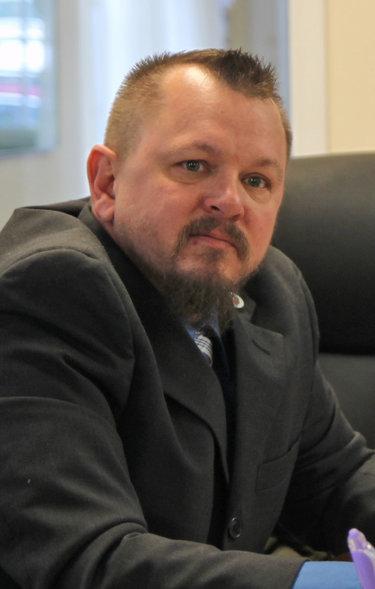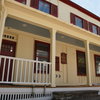Palow unveils new ’25 budget with 2-percent increase, no ambulance funding
BERNE — Berne’s new tentative 2025 budget, released over the weekend, will raise taxes only 2 percent, down from the 19-percent that had been proposed in the first tentative budget.
Supervisor Dennis Palow got expenses down from $2.8 million in the first budget to $2.66 million by, among other things, cutting out what would have been a $170,000 contribution to the Albany County Sheriff’s ambulance program, which the town relies on heavily in addition to the volunteer Helderberg Ambulance Squad.
The town is still funding Helderberg Ambulance, at $105,132 for 2025, according to the tentative budget.
Palow told The Enterprise this week that he won’t sign the contract with the county over disagreements about cost, and claimed that the county will provide ambulance service anyway. He said that former Supervisor Sean Lyons, who left office in 2022, had also opted not to sign the county contract during his last year in office and that it did not affect service.
County spokeswoman Mary Rozak told The Enterprise that there’s “no mandate that currently exists that this service needs to be provided by the county.”
Sheriff Craig Apple told The Enterprise in an email each municipality pays its “fair share of the operating costs” for county EMS based on census data.
He said he would “have to speak to the chair of the legislature and county executive on next steps but I would recommend withholding sales tax at a minimum.”
Sales tax is also allocated to municipalities based on census data and, for small towns like Berne that don’t have a robust tax base, goes a long way in funding budgets.
Berne’s tentative 2025 budget is predicting at least $1.2 million in sales tax.
Neither Lyons nor anyone at the Helderberg Ambulance Squad headquarters could be reached.
“Nobody is certified to do [advanced life support],” Palow said of the Helderberg squad, “only the county is, so if they get one of those calls, they have to come anyway.”
Like a number of other supervisors in the Enterprise coverage area that rely on county ambulances, Palow said he felt the cost should come from the county’s budget, not from town or village budgets. Residents would still be taxed for the service, but through the county, making it easier for towns to stay underneath the state’s 2-percent tax cap.
However, as The Enterprise previously reported, the county is unable to create a tax district for its ambulance services without state legislation that’s yet to be passed.
Palow also took issue with the cost increase that the county is imposing on the town — from $115,000 this year to $170,000 for 2025 — when, he says, the Helderberg Ambulance Squad, an independent not-for-profit, answers local calls and are “helping out for services up here.”
Albany County Legislator Chris Smith, a Conservative who last ran on the Democratic line to represent Berne as part of the 39th District and owns the town’s popular Maple on the Lake restaurant, reached out to The Enterprise to say that he’s “very concerned” about the lack of ambulance funding, calling it a “huge risk.”
“I think the county paramedic program along with the Helderberg ambulance program work great together,” he wrote in an email. “I have to use ambulance service at my restaurant 5 to 10 times a year and the county paramedic is the first person there 50% of the time. I’m scared what will happen if nobody shows up next time.”
Other changes to the tentative 2025 budget were broadly related to “the union contract, departmental requests, contracts not negotiated at this time, and the desire to remain in the 2% tax cap,” Palow wrote in an email to The Enterprise that also was posted on social media.
There had been outcries about the budget posted online last week when the tax increase was reported by The Enterprise as being 19 percent, coming just a year after the town raised taxes more than 750 percent, which the Republican-backed board said was to make up for significant tax cuts during the COVID-19 pandemic.
The town was forced to raise taxes after spending down its unassigned fund balance to cover expenses (at least on paper — in reality, as The Enterprise has covered extensively, the town has made a habit of missing bill payments and overdrawing key accounts under Palow).
According to the state comptroller’s most recent data, from 2023, the town reported that it had less than $55,000 in its unassigned fund balance that year, down from nearly $1 million just two years earlier.
The large rainy-day account had been built up over decades under Democratic administrations; once Republicans gained a majority on the town board, taxes were cut, causing the fund to be drawn down.
Because the town is currently without a functioning town board, due to the resignations in mid-August of three of its members, Palow will be able to enact the tentative budget on his own, without a public hearing or any board votes, assuming Governor Kathy Hochul doesn’t step in to make an appointment before the final budget deadline of Nov. 20.
The town has tentatively canceled its Nov. 13 meeting.
“I hope all the residents in town are happy with the updated tentative budget and hoping we can start working together,” Palow said in the statement to The Enterprise and residents. “I understand we have our differences and that’s why there is a Republic, but let’s stop being each other’s enemies and start working together.”



